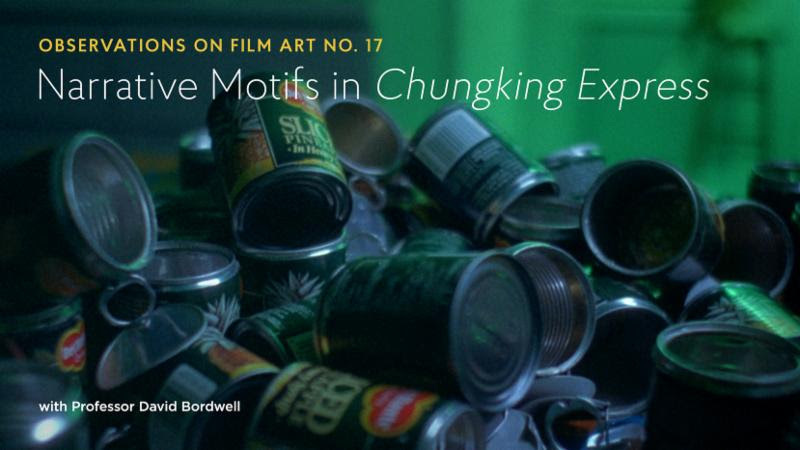
Since its under-the-radar release in 2007, Ronald Bronstein’s directorial debut, Frownland, has been admired by a generation of young filmmakers for its uncompromising vision, which has earned comparisons to the intense dramas of Mike Leigh and John Cassavetes. Shot on 16 mm, Bronstein’s film is a bleak but unforgettable character study about a New York door-to-door salesman, played with compassion and ferocity by Dore Mann. Watch this influential work of DIY cinema now in a new digital transfer on the Criterion Channel on FilmStruck, accompanied by a new, in-depth conversation between Bronstein and one of his New York film contemporaries, Josh Safdie.
Also up this week: a discussion of Wong Kar-wai’s Chungking Express; two otherworldly explorations of love and death by Thai master Apichatpong Weerasethakul and emerging Canadian filmmaker Connor Jessup, one long, one short; one of the greatest films of the silent era; a spotlight on filmmaker Rebecca Miller; and a double feature of brilliant comedies fueled by audacious narrative turns.
If you haven’t tried out FilmStruck, sign up now for your free 14-day trial. And if you’re a student, find out about our special academic discount!

Observations on Film Art No. 17: Narrative Motifs in Chungking Express
Wong Kar-wai’s Chungking Express (1994) captures the whiplash rhythms and tenuous connections of urban life in a bifurcated story that follows two heartsick Hong Kong cops (Takeshi Kaneshiro and Tony Leung) who cross paths at the Midnight Express take-out restaurant stand, where the ethereal pixie waitress Faye (Faye Wong) works. In this month’s episode of Observations on Film Art, a Channel-exclusive series that takes a look at how great filmmakers use cinematic devices and techniques, scholar David Bordwell isolates the recurring motifs that wind throughout the film and shows how Wong uses them to unite the story’s seemingly unrelated halves.
_large.jpg)
Tuesday’s Short + Feature: Lira’s Forest and Tropical Malady
Animal spirits enact rituals of love and death in this pair of sylvan fables by the director and the subject of this month’s new Meet the Filmmakers episode, Connor Jessup and Apichatpong Weerasethakul. Jessup’s short Lira’s Forest (2017) follows an ailing woman who receives a visit from a mysterious spirit and undergoes an otherworldly transformation. Apichatpong’s Tropical Malady (2004) chronicles the tender romance that blossoms between two young men in the Thai countryside, then plunges into the jungle where their love story is reconfigured as the tale of a hunter’s search for a legendary tiger. For more on these two filmmakers, check out our recent interview with Jessup on the Current.
_large.jpg)
The Passion of Joan of Arc: Edition #62
Spiritual rapture and institutional hypocrisy come to stark, vivid life in one of the most transcendent masterpieces of the silent era. Chronicling the trial of Joan of Arc in the hours leading up to her execution, Danish master Carl Theodor Dreyer depicts her torment with startling immediacy, employing an array of techniques—expressionistic lighting, interconnected sets, painfully intimate close-ups-to immerse viewers in her subjective experience. Anchoring Dreyer’s audacious formal experimentation is a legendary performance by Renée Falconetti, whose haunted face channels both the agony and the ecstasy of martyrdom. SUPPLEMENTAL FEATURES: three scores: Richard Einhorn’s Voices of Light, one by Goldfrapp’s Will Gregory and Portishead’s Adrian Utley, and one by composer and pianist Mie Yanashita; an audio commentary from 1999 by film scholar Casper Tybjerg; an interview from 1995 with actor Renée Falconetti’s daughter and biographer, Hélène Falconetti; and more.
_large.jpg)
Adventures in Moviegoing with Rebecca Miller
Filmmaker, visual artist, actor, and novelist Rebecca Miller sat down with us to share a personal history of moviegoing that stretches back to childhood. Miller’s parents, playwright Arthur Miller and photographer Inge Morath, initiated her into art-house cinema at an early age, fostering the eclectic taste that would go on to inform her creative life. Miller is fascinated with movies that stay anchored in emotional realism while violating the codes of naturalism. Here she explains how her work in various art forms has influenced her filmmaking, and selects a series of favorites that speak to her abiding interest in evoking psychic states on-screen, including John Cassavetes’s Opening Night, Agnès Varda’s Vagabond, and Jane Campion’s Sweetie.
_large.jpg)
By Rebecca Miller
In conjunction with our latest Adventures in Moviegoing episode, we’re presenting two films by director Rebecca Miller, who transitioned from visual art to filmmaking with her 1995 directorial debut, Angela, a haunting tale of a young girl who retreats into her fantasies to cope with her emotionally volatile mother. Miller’s vivid evocations of complex psychological states are a hallmark of her subsequent features, including the 2005 drama The Ballad of Jack and Rose, a devastating look at the twilight of the 1960s counterculture in which Daniel Day-Lewis plays a Scottish farmer whose discovery of new love throws his intensely close relationship with his teenage daughter into chaos.
_large.jpg)
Friday Night Double Feature: The Phantom of Liberty and Tampopo
When Juzo Itami set out to make a movie about human appetite and culinary culture, he couldn't figure out how to string together the episodes he had imagined, until he remembered The Phantom of Liberty, which struck him as “the kind of film where the last thing of the scene before leads to the next event—that kind of quick-change thing.” Luis Buñuel’s penultimate film is an audacious satire of bourgeois norms, from the hypocrisy of conventional morality to the arbitrariness of social arrangements, as told through a series of non sequiturs. Inspired by Buñuel’s “quick-change” structure, Itami interspersed the story of Tampopo’s eponymous heroine with the erotic exploits of a gastronome gangster and a string of standalone skits, spicing the broth of his “ramen western” with comic flavor.
from The Criterion Current https://ift.tt/2pR7HfP
Nessun commento:
Posta un commento